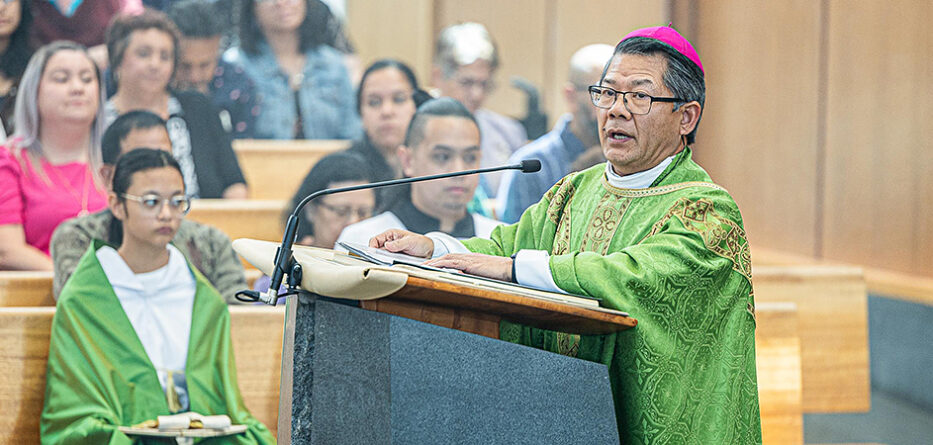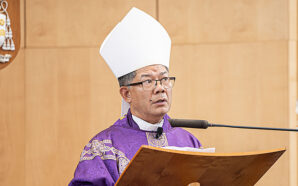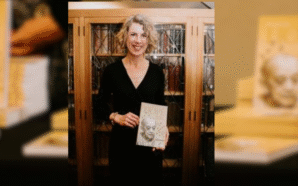Most Reverend Vincent Long Van Nguyen OFM Conv DD STL, Bishop of Parramatta
Homily for the 30th Sunday in Ordinary Time, Year B
Readings: Jeremiah 31:7-9; Hebrews 5:1-6; Mark 10:46-52
God uses the outcasts to show us the model of discipleship
Dear friends,
Many of us are fearful of disabilities of any kind -physical, mental, cognitive, intellectual etc. People with disabilities are regarded as a liability and a burden to others. Once upon a time, they were often consigned to large institutions or pushed to the margins of society. We have gradually grown in our understanding, respect and inclusion. Yet many barriers still exist for people with disabilities.
The truth of the matter is that we need one another in a communion of love. Sometimes we need people who are blind to teach us to see beyond physical sight and deaf people to teach us to hear beyond physical sound. That is because we are accustomed to certain ways of perceiving, thinking and acting. We can have prejudices and biases that cloud our judgement and limit our ability to empathise with those are different to us. Though I come from a humble background, I have privileges such as being able-bodied, male, heterosexual, ordained etc. As a result, I may not be able to fully appreciate the unique life-experiences of others. I need to be open to learn from the wisdom that comes from difference.
People with disabilities can lead us more fully into an understanding of the gospel message and of the life of Jesus. In fact, St John Paul II observed that “they can teach everyone about the love that saves us; they can become heralds of a new world, no longer dominated by force, violence and aggression, but by love, solidarity and acceptance, a new world transfigured by the light of Christ, the Son of God who became incarnate, who was crucified and rose for us.”
The Word of God today speaks of the God who reveals himself as being in deep communion with the outcasts. He identifies himself with them. Therefore, those who are rejected by society because of their weakness and their apparent uselessness are in fact a presence of God. If we welcome them, they lead us progressively out of a world of competition and the need to do great things, towards a world of communion of hearts.
In the first reading, the prophet Jeremiah speaks words of comfort and hope to his people. During the long and harrowing exile in Babylon, many of them had given up their ancestors’ faith and drifted away. Those who remained loyal and steadfast in spite of the ordeal came to be known in the prophetic literature as the remnants of Israel. These were not the movers and shakers, the elites and the echelons of Jewish society. Rather the remnants were the people considered to be the lowliest and the most vulnerable among the exiles. Jeremiah referred to them as “the blind, the lame, women with child and women in labour”. He galvanised them with fresh hope. He prophesied that God would bring them back from captivity and they would rebuild Israel.
The Gospel depicts Jesus as one who engenders hope in despair, light in darkness and grace in vulnerability. He and his disciples were found around Jericho which was the last stop before their destination in Jerusalem. There, Jesus met, healed and changed the life of the blind beggar. He saw the faith and dignity of someone whom society dismissed as inconsequential. We can see the contrast between the attitude of the crowd towards the blind beggar and that of Jesus. When he cried out “Jesus, Son of David, have pity on me”, many rebuked him telling him to be silent. The voice of Bartimaeus was considered of little value. It was Jesus who turned this assumption upside down. He attuned his ear to the cry of the beggar; he sought him out; he affirmed his dignity; he championed his cause.
The blind beggar on his part did something that everyone else failed. He acknowledged who Jesus truly was. For in the Gospel, the title Son of David is indicative of the true identity of Jesus. He is the Messiah, the Saviour. In other words, the blind beggar was able to see much more than the crowd. He possessed true vision. That is the irony. The people who had physical sight yet were blinded by their prejudices. Bartimaeus turned out to be the unlikely hero of discipleship.
Dear brothers and sisters,
In the midst of our own darkness, we need the vision that Jeremiah gave to the exiles and Jesus gave to Bartimaeus. Like the remnants of Israel, we too must learn to be an alternative society of solidarity, compassion, justice and love in the midst of the brave new world around us. Jeremiah’s messianic vision of a caring and viable society for the vulnerable still challenges us today. We have much to learn from our ancestors in faith. We must learn to be once again the Church that embodies God’s compassion, that ministers at the peripheries, that advocates for the rights and wellbeing of the poor.
Jesus poses the same question to Bartimaeus as he did to James and John last week. “What do you want me to do for you?” As it turns out, it is the latter who despite his disability has what it takes to be the true follower. He asks for vision and once given, he uses it to follow Jesus the light of the world. Let us also ask for the vision of faith that enables us to see and act according to the values of the Gospel. Let us follow him not by the way of power and glory by the way of the self-giving love.







